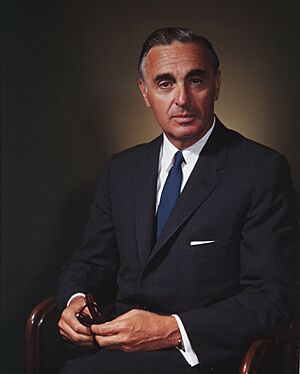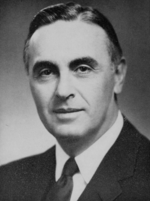Abraham Ribicoff facts for kids
Quick facts for kids
Abe Ribicoff
|
|
|---|---|
 |
|
| Chair of the Senate Governmental Affairs Committee | |
| In office December 31, 1974 – January 3, 1981 |
|
| Preceded by | Sam Ervin |
| Succeeded by | William Roth |
| United States Senator from Connecticut |
|
| In office January 3, 1963 – January 3, 1981 |
|
| Preceded by | Prescott Bush |
| Succeeded by | Chris Dodd |
| 4th United States Secretary of Health, Education, and Welfare | |
| In office January 21, 1961 – July 13, 1962 |
|
| President | John F. Kennedy |
| Preceded by | Arthur Flemming |
| Succeeded by | Anthony J. Celebrezze |
| 80th Governor of Connecticut | |
| In office January 5, 1955 – January 21, 1961 |
|
| Lieutenant | Charles Jewett John Dempsey |
| Preceded by | John Davis Lodge |
| Succeeded by | John Dempsey |
| Member of the U.S. House of Representatives from Connecticut's 1st district |
|
| In office January 3, 1949 – January 3, 1953 |
|
| Preceded by | William J. Miller |
| Succeeded by | Thomas J. Dodd |
| Member of the Connecticut House of Representatives from the Hartford district |
|
| In office 1938–1942 Serving with Albert Carignan (1938–1940), Ernest Racicot (1940–1942)
|
|
| Preceded by | Ernest Racicot Thomas Leavy |
| Succeeded by | Harold Conroy Rene Dupuis |
| Personal details | |
| Born |
Abraham Alexander Ribicoff
April 9, 1910 New Britain, Connecticut, U.S. |
| Died | February 22, 1998 (aged 87) New York City, New York, U.S. |
| Political party | Democratic |
| Spouses | |
| Education | New York University University of Chicago (LLB) |
Abraham Alexander Ribicoff (April 9, 1910 – February 22, 1998) was an American politician. He was a member of the Democratic Party from Connecticut. Ribicoff served in the United States House of Representatives and the Senate. He was also the 80th Governor of Connecticut. Later, he became Secretary of Health, Education, and Welfare for President John F. Kennedy. He was the first and only Jewish governor of Connecticut.
Contents
Early Life and Education
Abraham Ribicoff was born in New Britain, Connecticut. His parents were Jewish immigrants from Poland. They worked hard in factories. His parents believed education was very important. They made sure he saved all his earnings for school.
After high school, he worked at a zipper factory. This helped him earn money for college. He started at New York University in 1928. Later, he moved to University of Chicago when his job transferred him. He even started law school before finishing his first degree.
In 1931, he married Ruth Siegel. They had two children. Ribicoff graduated from the University of Chicago Law School in 1933. He became a lawyer in Connecticut that same year. He opened his own law office in Hartford.
Starting His Political Journey
Ribicoff became interested in politics early on. He served in the Connecticut House of Representatives from 1938 to 1942. He also worked as a judge for the Hartford Police Court. During these years, he was mentored by John Moran Bailey. Bailey was a powerful leader of the Democratic Party of Connecticut.
Serving in the U.S. House
Ribicoff was elected to the United States House of Representatives. He served two terms, from 1949 to 1953. He was on the Foreign Affairs Committee. This was a big deal for a new member. He usually supported President Harry S. Truman's plans.
He was generally a liberal thinker. But he once surprised many by opposing money for a dam. He felt the money was better spent on military needs. He also thought it should go to foreign aid programs like the Marshall Plan. In 1952, he tried to become a U.S. Senator but lost.
Governor of Connecticut
After practicing law for two years, Ribicoff ran for governor. He won the election in 1954 by a very small number of votes. As governor (1955–1961), he faced a big challenge. Devastating floods hit Connecticut in 1955. He worked with both political parties to help the damaged areas.
Ribicoff also pushed for more state money for schools. He supported welfare programs too. He was easily reelected in 1958. By then, he was becoming well-known nationally. He was a good friend of Senator John F. Kennedy from Massachusetts. Ribicoff supported Kennedy's run for president.
Cabinet Role: Secretary of HEW
When Kennedy became president in 1961, he offered Ribicoff a cabinet job. Ribicoff chose to be Secretary of Health, Education, and Welfare (HEW). This department handled health, education, and social programs.
He helped change the Social Security Act. This made it easier for families to get help. However, he struggled to get approval for Medicare. He also couldn't get school aid bills passed. He found the department too big and hard to manage. Ribicoff felt that health and welfare issues overshadowed education during his time.
Serving in the U.S. Senate
Ribicoff was elected to the United States Senate in 1962. He served there from 1963 to 1981. This was a long and important part of his career.
When Lyndon B. Johnson became president, Ribicoff first supported him. But he later disagreed with the Vietnam War. He believed the war took too many resources away. He felt these resources were needed for programs at home.
Ribicoff worked with consumer advocate Ralph Nader. They helped create the Motor Vehicle Highway Safety Act of 1966. This law led to the creation of the National Highway Traffic Safety Administration. This agency set many new safety rules for cars. Ribicoff believed that even if drivers made mistakes, cars should be safer.
At the 1968 Democratic National Convention, Ribicoff gave a speech. He spoke about the police actions during anti-war protests in Chicago. He said that with George McGovern as president, such actions wouldn't happen. Many people applauded him.
During his Senate career, Ribicoff fought for important issues. These included school integration and welfare reform. He also worked on tax reform and consumer protection.
In 1972, presidential candidate George McGovern offered Ribicoff the Vice-Presidential spot. Ribicoff turned it down. He said he had no desire for higher office. Later that year, his first wife passed away. Ribicoff then married Lois Mell Mathes, known as "Casey."
Ribicoff chaired important Senate committees. These included the United States Senate Committee on Government Operations. He retired from the Senate in 1981.
Later Life
After leaving the Senate, Ribicoff worked as a special counsel. He joined a law firm in New York. He split his time between homes in Connecticut and New York City. He also helped with a commission that decided which military bases to close.
In his later years, he suffered from Alzheimer's disease. Abraham Ribicoff passed away in 1998 in New York City. He was buried in Cornwall, Connecticut.
See Also
- List of Jewish members of the United States Congress


